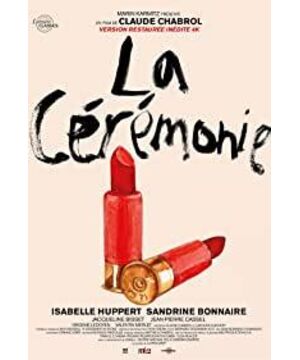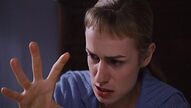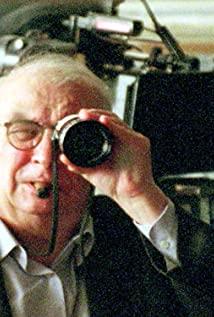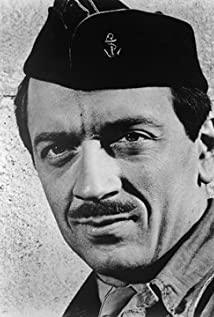This film is more like a pseudo-documentary film, very close to the pseudo-documentary classic "Battle of Algiers". The author does not make moral judgments on both sides of the war, no matter what is right or wrong, and only tells the story fairly. However, the film can only be called close to justice. This is because before the shooting, the two girls threw donations in front of the owner of the church, and even insulted the old man who donated clothes. suspected.
Having said that, even the Battle of Algiers can only be as fair as possible.
It is not all out of a sense of justice that accomplished film directors are happy to pursue justice. The more important reason is that even the most heinous villain in the movie has his own reasons for his actions.
The filmmaker is a lone chess player, and since no one is playing against him, he can only fight left and right. If the author takes either side, there will either be a hero who makes a fuss, or a villain who is mentally retarded.
The accomplished creator knows that man only does what he thinks is right.
Much of the discussion of Grim Ritual focuses on class and morality. However, indulging in the analysis of class contradictions and moral disputes can only poison the creativity of the writer.
Whether it is class conflicts or moral disputes, in the final analysis it stems from human desires. The desire of the protagonist happens to be the primary task of film studies.
When the film explains the desires of each character, class conflicts and moral disputes will naturally grow in the sparks that collide between the different desires of the characters.
"I don't know, I'm not sure, whatever", these are Sophie's mantras.
It's not that Sophie has no opinion, she just doesn't care. The hostess asked her if she was satisfied with the room, and she said she didn't know, because she thought it didn't matter if she was satisfied or not.
In the bakery, she couldn't read the price of the goods, so she paid with large bills. The shopkeeper snatched her wallet and opened it up to reveal that she had enough change. Sophie was not ashamed.
Sophie asked Jenny if she killed her daughter. Jenny was enraged by Sophie. Although she pretended to be indifferent on the surface, she betrayed her by resuscitating Fei with the news from the old newspaper.
Jenny wanted to humiliate Sophie by wanting Sophie to read the news herself, but Jenny's desire to humiliate Sophie was too eager, so she grabbed the newspaper and read it herself.
Sophie on the side was eating calmly, unmoved at all.
Jenny hit the fatal blow according to the plan rehearsed in her heart, tapping the photo in the newspaper and asking Sophie, is this you? If it was an ordinary person who was asked this by Jenny, he would have already turned blue with embarrassment.
However, Sophie's reaction was indeed a smile, a little smug, as if someone had discovered her glorious deeds in a newspaper.
When George dismissed Sophie, facing George's reprimand, Sophie remained expressionless. Even when the priest scolded them, Jenny forced her composure to deal with the humiliation that came. Sophie, who was behind her, held back her smile.
Sophie's reactions prove that she suffers from antisocial personality disorder. She does not feel ashamed or guilty when she does bad things or hurts others.
What keeps us from doing bad things or hurting others is our own sense of shame and guilt, a mechanism of self-discipline that people call conscience.
So it makes no sense to judge Sufis morally, because the social moral system doesn't work for Sufis.
Sophie's dyslexia is the only thing that makes her feel ashamed and guilty. So concealing dyslexia was the only thing she cared about, and it was her desire.
Sophie's desire to hide her dyslexia has been challenged by her host family.
The host asked Sophie to learn to drive, but Sophie used a lie to excuse her.
The hostess's ironing note crisis was avoided by Sophie with the help of her daughter.
We can see that Sophie has a momentary affection for her daughter because of her help. However, the owner's family went on a trip and missed the opportunity to build trust with Sophie, which also gave Jenny an opportunity to take advantage of it. Jenny seduces Sophie but fails.
The shopping list that the hostess left to Sophie was a big crisis for Sophie. In order to hide her dyslexia, Sophie has no other choice but to turn to Jenny, the only acquaintance in the village. Jenny used this to successfully win over Sophie.
Sophie became interested in Jenny because she overheard that the hostess broke the news that Jenny had killed her biological daughter.
Sophie, who also had the experience of killing her father, because she had no guilt and was close to someone who had committed the same crime, not only did she not feel uneasy, but Jenny, who had the same experience, attracted Sophie instead.
Many comments believe that Sophie's friendship was inadvertently influenced by Jenny. In fact, Jenny has no ability to influence Sophie at all.
Jenny's existence only adds weight to the employer's decision to fire Sophie. Another meaning of Jenny's existence is that she caused the employer's family to die by shooting.
Even without Jenny, Sophie's secret will be discovered by her employer's family one day. When the secret is discovered, even if the employers don't fire Sophie, and even offer her mercy and help, they are still rewarded with Sophie's bitter hatred.
If there is no Jenny, the employer's family may die in the fire even if they are not shot. After all, arson and murder are familiar to Sophie.
Jenny just gave Sophie a reason to break into the employer's house and take a shotgun.
Jenny was insulted by the priest and her willpower was weak. She even confided her heart to Sophie, and told the story of her mistakenly killing her daughter. Of course, how much of this memory is true and how much is a lie, we do not know.
Even though Jenny treats her with sincerity and exchanges her secret for Sophie's, Sophie does not reveal the fact that she was fired by her employer, because the truth involves Sophie's dyslexia.
Sophie holds a shopping list and shows just as much satisfaction as she pretends to be literate at the store, so much her pain when the secret is revealed. Secret exposure is the final boss of the movie, and killing everyone who knows the secret seems like Sophie's best option.
Therefore, Jenny should be thankful that Sophie didn't tell her the truth, otherwise the bullets in the shotgun might also have her share.
Sophie has no sense of shame or guilt. Killing is no burden to her. She only needs to decide the reason and method of killing. Jenny happened to provide the why and how, just as she helped Sophie choose the chocolates.
Jenny's desire is not revenge, her desire is to have the life of her employer's wife.
When she was young, she dreamed of being an actress, but she failed, and the role was taken away by a blonde.
In Jenny's eyes, the employer's wife is a model. Jenny believes that models are just like actors. In Jenny's heart, she should be an actress, so the life of the employer's wife should belong to her.
However, Jenny is just a post office clerk. Dreams are shattered, love fails, and even raising children goes wrong.
The accumulation of various failures further aggravated her desire to have a life she should have had.
Jenny's trouble with her employer's family is not because she hates the rich, or because she doesn't get along with the hostess, but because the hostess is a retired model, that's why Jenny has set her sights on this family.
At first Jenny was just curious, so she did everything possible to approach the employer's family, such as Jenny rubbing the mistress's ride.
For example, under the pretext of sending a letter to Sophie, she visited her employer's house.
Although she can't have it, it is also satisfying to see the life she should have.
Therefore, Jenny always opened the mail of the male host privately and spied on the life of the employer's family.
From the dialogue between the hostess and Sophie, we can see that the host does not like to see Jenny.
The hostess tried her best to maintain social etiquette, but the look at Jenny through the rearview mirror also revealed disgust.
Even the gentlest daughter in the family, after offering her help, gently tossed Jenny's handkerchief through her car window.
Jenny wanted to ease the pain caused by the insatiable desires by approaching her employer's family, but she hit a wall everywhere.
Therefore, she approached Sophie and used Sophie to experience the life that should belong to her, even if it was just to visit the house, or watch the satellite TV in the servant's room, which symbolized the superior life at that time, so that she could be satisfied.
Another advantage of using Sophie is to take revenge, instigate Sophie, and cause a little trouble to the employer's family. This is the price they should pay for despising Jenny for a long time.
Unlike Sophie, Jenny is an ordinary person, an ordinary person who pretends to be a sociopath.
She will hold grudges when others dislike her, and she will feel humiliated when others reprimand her. She uses Sophie to instigate Sophie, but is influenced by Sophie instead. Until the end, she just wanted to play a little prank, but she was dragged into the water by Sophie, and she took her life.
After she confessed to Sophie about her accidental murder of her daughter, Sophie was unmoved, which made Jenny pretend to be tough. She wanted to convince herself that she was the coolest of the two, and she was the coolest of the two. 's leader.
To this end, she wreaked havoc, bluffing with a shotgun, not expecting Sophie to actually shoot.
She told Sophie to clean up the scene and asked Sophie to call the police, but she drove away from the scene and threw the pot on Sophie alone. But he never thought that he was not even as lucky as Sophie.
If Sophie is a demon, then Jenny is at best a bad demon worshiper.
It would be a mistake to think that these two men represent the poor. The biological father and biological daughter who were killed by them have no class conflict with them.
Their atrocities have nothing to do with class. They are violent because they are sick. What their atrocities lack is just a proper reason. This time the killing was because of the difference between the rich and the poor. Who knows what the reason for their killing will be next time. Maybe because of a joke, maybe because of a bar of chocolate. Maybe because someone unfortunate was in the wrong place at the wrong time.
Patients like Sophie and Jenny, no matter what class they are in, are still patients. Social status and wealth are not a panacea, so they cannot be cured. If you are sick, you should see a doctor.
If patients like Jenny and Sophie, who hold wealth and power, will only become more dangerous.
As for the host, George, his illness is both uneducated and stupid. This kind of disease can't even be cured by a doctor. The only one who can help him is his father, or get a copy of "The Godfather" and read it twice more.
Text/Year-by-Year Chasing Movies (a public account for researching movies)
View more about La Cérémonie reviews











